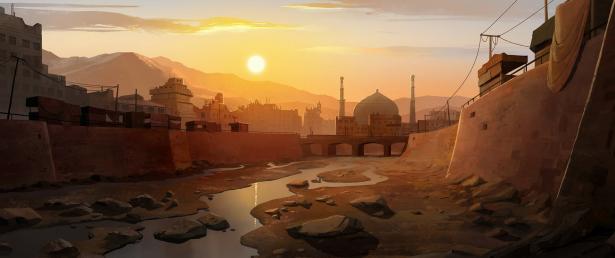Further proof that we are living through a golden age of animation is provided by this Oscar-nominated marvel from Kilkenny’s Cartoon Saloon, the studio behind The Secret of Kells and Song of the Sea. An Irish-Canadian-Luxembourgish co-production, adapted from Deborah Ellis’s much-loved YA novel, it’s a tale of youthful fortitude in Taliban-era Afghanistan that has something of the defiant feminist spirit of the French-Iranian gem Persepolis.
Flitting between a mythical past and a down-to-earth present, the story is full of scary monsters – from fantastical demons to all-too-real landmines and brutal beatings. Yet The Breadwinner looks through the eyes of a resilient young girl whose courage is our guide. Along with the eerie beauty of the animation there is a salving streak of humour that softens this tale’s sharper edges, reminding us that – for children – laughter and bravery walk hand in hand.
We first meet 11-year-old Parvana (affectingly voiced by Saara Chaudry) on the streets of Kabul, where she is helping her father, Nurullah (Ali Badshah), to sell their meagre goods. A teacher by trade, he lost a leg in the Russian war, but is now considered a subversive for encouraging his daughters to be independent – to learn the history of their land and to understand the liberating power of its stories. “Stories remain in our hearts, even when all else is gone,” Nurullah tells Parvana, although she’s starting to wonder: “What’s the use?”
When Nurullah is arrested by the Taliban, Parvana’s family (mother, sister, baby brother) are unable to buy food, since women cannot leave their homes unchaperoned. So Parvana cuts her hair, puts on the clothes of her dead brother, and ventures out into the streets. “When you’re a boy, you can go anywhere you like!” says fellow traveller Shauzia (Soma Chhaya) as Parvana experiences a whole new world – a magic-carpet ride full of vibrant colour and bustling life. But the storm clouds of war are gathering once more, and Parvana must secure her father’s release before it’s too late.
While researching her novel in the late 1990s, Ellis spent time interviewing girls and women in refugee camps in Pakistan. In this superb screen adaptation, director Nora Twomey and screenwriter Anita Doron have retained the cultural authenticity of Ellis’s book while expanding the narrative in adventurous ways. A story within the story provides both a potted history of Afghanistan (“We were scientists, philosophers and storytellers, but we were at the edges of empires at war with each other”) and a parallel narrative of Parvana’s struggles, told in fabulist fashion. Conjured through spiralling cut-out animations, these folkloric threads centre on a “dreadful elephant king” with spiked tusks whose red-eyed jaguars terrorise a village. In this story it falls to a dancing boy to secure the future, something he can only do by facing the demons of his past, a lesson that Parvana must also learn.
The theatricality of these sequences is in sharp contrast to the more realistically rendered world of Parvana’s day-to-day life. Here, the back streets and market places are as vividly realised as anything from the Israeli animated documentary Waltz With Bashir, albeit filtered through a visual poetry that captures the misty “honey light” of early morning Kabul. A landscape of abandoned tanks becomes a haunting playground in which our heroines share their dreams of the moon and the ocean, conjuring a Shawshank Redemption-style tide of hope that flows like a river through the narrative.
The characters have quietly eloquent faces in which a single line beneath an eye can bespeak age, weariness, worry or anger. Domestic rituals are affectionately observed – particularly communal meals of rice and raisins (“you will feel better when your belly is full”) – in which complex family dynamics are revealed through tiny gestures. Crucially, all these players are drawn with a tangible tenderness – from baby Zaki, a burbling, button-nosed bundle of joy, to a young Taliban bully who terrorises Parvana, but who is himself revealed to be riven with fear.
Mychael and Jeff Danna’s music is lyrical and expressive, blending eastern instruments with western orchestrations as it moves from pieces echoing the street sounds of Kabul to the more expansive evocations of the enchanted story-world. A thrilling climax brings together all the threads that weave through this terrific movie. Executive producer Angelina Jolie’s name has star power, but it’s the self-effacing Twomey, making her solo directorial feature debut, who is the real heroine of this wonderful film.
[Writer and broadcaster Mark Kermode is the Observer's chief film critic. He is the author of Hatchet Job and The Good, the Bad and the Multiplex. Follow him on twitter: @kermodemovie]


Spread the word